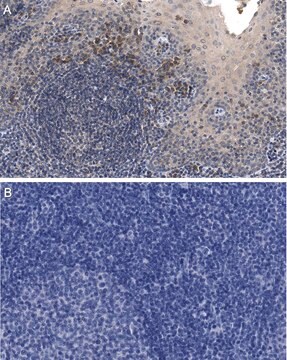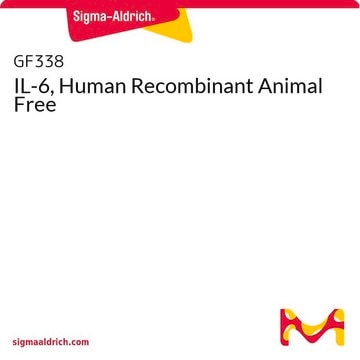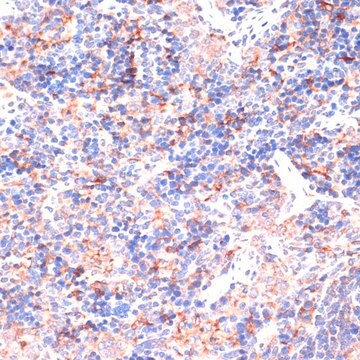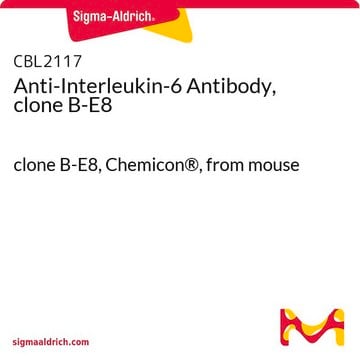AB1839
Anti-Interleukin-6 Antibody
serum, Chemicon®
Synonyma:
IL-6
Přihlásitk zobrazení cen stanovených pro organizaci a smluvních cen
About This Item
UNSPSC Code:
12352203
eCl@ss:
32160702
NACRES:
NA.41
Doporučené produkty
biological source
rabbit
Quality Level
antibody form
serum
antibody product type
primary antibodies
clone
polyclonal
species reactivity
sheep
manufacturer/tradename
Chemicon®
technique(s)
ELISA: suitable
western blot: suitable
NCBI accession no.
UniProt accession no.
shipped in
dry ice
target post-translational modification
unmodified
Gene Information
sheep ... Il6(443406)
Specificity
Reacts with ovine IL-6. No reactivity detected to recombinant ovine IL-1beta, IL-8, MCP or TNFalpha.
Immunogen
Recombinant ovine IL-6
Application
Anti-Interleukin-6 Antibody is an antibody against Interleukin-6 for use in ELISA & WB.
Detecting antibody in ELISA, using monoclonal anti-ovine IL-6 as capture antibody. Recommended dilution factor 1:500. See suggested protocol.
Western Blot
Optimal working dilutions must be determined by the end user.
Suggested ELISA Protocol For Ovine IL-6
1. Coat high capacity microtitre wells (e.g. Nunc maxisorp) with monoclonal anti-IL-6 antibody (Chemicon Catalog Number MAB1004) at a concentration of 5 μg/mL in 0.1 M carbonate buffer pH 9.6 overnight at 4ºC.
2. Wash wells 3 x with PBS + 0.05% Tween 20 (PBST).
3. Add samples to wells. Incubate at room temperature in a humidified box for 1 hour. Wash 3 x with PBST.
4. Dilute rabbit anti-IL-6 (Chemicon Catalog Number AB1839) 1:500 in PBST and add 100 μL to wells. Incubate at room temperature for 30 minutes. Wash 3 x with PBST.
5. Dilute anti-rabbit IgG-HRP to appropriate level in PBST and add 100 μL to wells. Incubate 30 minutes at room temperature. Wash 3 x with PBST.
6. Add 100 μL of TMB chromagen to each well. Incubate for 5-10 minutes and stop reaction with 50 μL of 2M sulphuric acid.
Notes:
The anti-rabbit IgG HRP must be adsorbed against mouse immunoglobulin, and should be checked for non-reactivity with coated plates.
Non-specific binding may be reduced by addition of protein such as skim milk powder to the diluents.
Assay sensitivity may be altered by adjusting incubation times and reagent concentrations.
Western Blot
Optimal working dilutions must be determined by the end user.
Suggested ELISA Protocol For Ovine IL-6
1. Coat high capacity microtitre wells (e.g. Nunc maxisorp) with monoclonal anti-IL-6 antibody (Chemicon Catalog Number MAB1004) at a concentration of 5 μg/mL in 0.1 M carbonate buffer pH 9.6 overnight at 4ºC.
2. Wash wells 3 x with PBS + 0.05% Tween 20 (PBST).
3. Add samples to wells. Incubate at room temperature in a humidified box for 1 hour. Wash 3 x with PBST.
4. Dilute rabbit anti-IL-6 (Chemicon Catalog Number AB1839) 1:500 in PBST and add 100 μL to wells. Incubate at room temperature for 30 minutes. Wash 3 x with PBST.
5. Dilute anti-rabbit IgG-HRP to appropriate level in PBST and add 100 μL to wells. Incubate 30 minutes at room temperature. Wash 3 x with PBST.
6. Add 100 μL of TMB chromagen to each well. Incubate for 5-10 minutes and stop reaction with 50 μL of 2M sulphuric acid.
Notes:
The anti-rabbit IgG HRP must be adsorbed against mouse immunoglobulin, and should be checked for non-reactivity with coated plates.
Non-specific binding may be reduced by addition of protein such as skim milk powder to the diluents.
Assay sensitivity may be altered by adjusting incubation times and reagent concentrations.
Research Category
Inflammation & Immunology
Inflammation & Immunology
Research Sub Category
Cytokines & Cytokine Receptors
Cytokines & Cytokine Receptors
Linkage
Replaces: 04-1095
Physical form
Rabbit serum. Liquid containing 0.1% sodium azide.
Storage and Stability
Maintain at -20°C in undiluted aliquots for up to 12 months. Avoid repeated freeze/thaw cycles.
Legal Information
CHEMICON is a registered trademark of Merck KGaA, Darmstadt, Germany
Disclaimer
Unless otherwise stated in our catalog or other company documentation accompanying the product(s), our products are intended for research use only and are not to be used for any other purpose, which includes but is not limited to, unauthorized commercial uses, in vitro diagnostic uses, ex vivo or in vivo therapeutic uses or any type of consumption or application to humans or animals.
Ještě jste nenalezli správný produkt?
Vyzkoušejte náš produkt Nástroj pro výběr produktů.
Storage Class
10 - Combustible liquids
wgk_germany
WGK 2
Osvědčení o analýze (COA)
Vyhledejte osvědčení Osvědčení o analýze (COA) zadáním čísla šarže/dávky těchto produktů. Čísla šarže a dávky lze nalézt na štítku produktu za slovy „Lot“ nebo „Batch“.
Již tento produkt vlastníte?
Dokumenty související s produkty, které jste v minulosti zakoupili, byly za účelem usnadnění shromážděny ve vaší Knihovně dokumentů.
Gunlawadee Maneenil et al.
PloS one, 10(3), e0119281-e0119281 (2015-03-21)
A fetal inflammatory response (FIR) in sheep can be induced by intraamniotic or selective exposure of the fetal lung or gut to lipopolysaccharide (LPS). The oral, nasal, and pharyngeal cavities (ONP) contain lymphoid tissue and epithelium that are in contact
Clare A Berry et al.
Reproductive sciences (Thousand Oaks, Calif.), 18(11), 1092-1102 (2011-04-16)
We tested the hypothesis that interleukin 1 (IL-1) mediates intra-amniotic lipopolysaccharide (LPS)-induced chorioamnionitis in preterm fetal sheep. Time-mated Merino ewes with singleton fetuses received IL-1α, LPS, or saline (control) by intra-amniotic injection 1 to 2 days before operative delivery at
Modulation of lipopolysaccharide-induced chorioamnionitis by Ureaplasma parvum in sheep.
Snyder, CC; Wolfe, KB; Gisslen, T; Knox, CL; Kemp, MW; Kramer, BW; Newnham, JP; Jobe et al.
American Journal of Obstetrics and Gynecology null
Tate Gisslen et al.
Innate immunity, 20(2), 214-224 (2013-06-12)
Histologic chorioamnionitis, frequently associated with preterm births and adverse outcomes, results in prolonged exposure of preterm fetuses to infectious agents and pro-inflammatory mediators, such as LPS. Endotoxin tolerance-type effects were demonstrated in fetal sheep following repetitive systemic or intra-amniotic (i.a.)
Modulation of lipopolysaccharide-induced chorioamnionitis in fetal sheep by maternal betamethasone.
Wolfe, KB; Snyder, CC; Gisslen, T; Kemp, MW; Newnham, JP; Kramer, BW; Jobe, AH; Kallapur, S
Reproductive Sciences null
Náš tým vědeckých pracovníků má zkušenosti ve všech oblastech výzkumu, včetně přírodních věd, materiálových věd, chemické syntézy, chromatografie, analytiky a mnoha dalších..
Obraťte se na technický servis.








